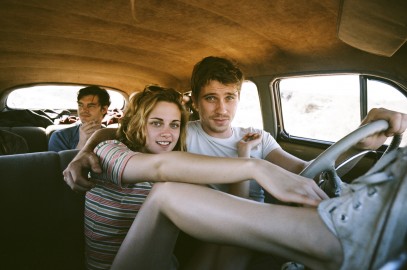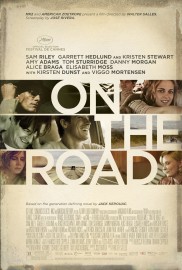Kerouac’s “On The Road” takes a detour

By Gina Scialabba
The Guardsman
Another example of a book that shouldn’t be a film.
“The only people for me are the mad ones, the ones who are mad to live, mad to talk, mad to be saved, desirous of everything at the same time, the ones who never yawn or say a commonplace thing, but burn, burn, burn…”
— Sal Paradise
The open road has always fascinated Americans. From Route 66 to the Pacific Coast Highway, getting in the car and driving is a visible expression of our freedom.
Before Thelma and Louise drove around evading the law.
Before Harold and Kumar got stoned and drove to White Castle.
Before the “Y Tu Mama Tambien” trio drove in search of an elusive beach, author Jack Kerouac searched for himself in the semi-autobiographical book “On the Road.”
The novel tells the story of youth joyfully burning the candle at both ends.
Sal Paradise (Sam Riley) is a young writer whose life is shaken and ultimately redefined by the arrival of Dean Moriarty (Garrett Hedlund), a free-spirited, fearless, fast-talking James Dean-type and his girl, Marylou (Kristen Stewart).
The book was unquestionably iconic, inspiring “the Beat Generation,” a group of displaced youth in the 1950s and 1960s (think Kerouac, Ginsburg and Burroughs) on the brink of modernity following World War II.
These “Beatniks” were emboldened young people lacking the same naive optimism that existed in previous eras. They were restless, unable to fit into mainstream society at a time of widespread complacency, economic boom and June Cleaver-like suburban sprawl.
Kerouac himself described them as “a generation of crazy, illuminated hipsters suddenly rising and roaming America, serious, bumming and hitchhiking everywhere, ragged, beatific, beautiful in an ugly, graceful new way.” His redefinition of the world was inspirational.
This movie is not. Some books just shouldn’t be made into films.
Legend has it that Kerouac originally envisioned turning the book into a movie starring himself as Sal and legendary bad boy Marlon Brando as Dean. That never came to pass.
Instead, the Francis Ford Coppola family bought the exclusive adaptation rights to the project.
This book should have been left on the page and in our imaginations.
While the screenplay, written by Jose Rivera, is a noble attempt at recapturing the Kerouac allure, it falls flat.
Perhaps it’s that the “progressiveness” of Sal, Dean and Marylou just isn’t that progressive anymore.
Or maybe the film tries too hard.
I came away feeling these characters were extremely unlikeable, their lifestyle rather tired. We’ve seen this type of left-of-center behavior before and it rarely ends well.
Ask Kerouac. Our hard-drinking hero died in 1969 at age 47 from cirrhosis of the liver.
Perhaps it’s the acting.
Sure, the actors are physically attractive. Dean and Sal are easy on the eyes, but it ends there.
Carlo Marx, the character Allen Ginsberg is modeled upon, is laughable, almost cartoonish.
Least I forget Kristen Stewart. Woe be the day when audiences are forced to sit through another one of her films. The beloved Bella of the “Twilight” series can’t act.
Stoic, monotone, angry and back to monotone. That’s all she’s got. She lacks any depth or range. Stewart is even worse than Hayden Christensen, the robotic “Mannequin Skywalker” of Star Wars Episodes II and III.
Her portrayal of Marylou is one-dimensional and her limited acting range stunts any serious character development.
Stewart does take her top off, but even that can’t save her dismal performance.
This movie is about movement. Perpetual motion. Sal, Dean and Marylou live fast, experimenting with sex, jazz and drugs.
While this may sound like a 1960s utopia, it’s not. The characters are essentially running away from reality and into the arms of substance abuse. Their restlessness comes across as disconcerting. Each “high” needs to be higher.
Through all of the constant movement, we meet an array of colorful characters, shifting landscapes and a memorable soundtrack.
Alas, the film has some saving grace. The cinematography is exquisite.

We get a tour of the highways and byways of Americana from New York to San Francisco and as far south as Mexico.
Sprawling fields, sweeping mountains and dusty landscapes. This may be the one, and only time, Campbell, Calif., is featured in a movie.
The soundtrack is also rather moving. Included are blues selections from Son House, Slim Gaillard, Coati Mundi, and Greg Kramer, as well as Ella Fitzgerald singing “I’ve Got the World on a String.”
The largely original score is from Academy Award-winning composer Gustavo Santaolalla, who won consecutively for his work in “Brokeback Mountain” and “Babel.”
Fans of the book will get a treat. A special reading of “On The Road” by Kerouac himself at the end of the film.
Bottom line: This is a respectable attempt at adapting a classic for the screen, but ultimately fails.
